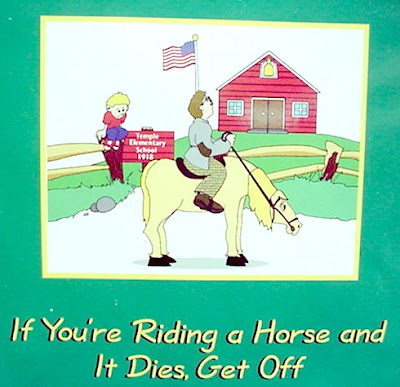This small picture book points out the futility of trying to 'tinker' education into the 21stC - after trying several well known reforms it suggests what is required is a total transformation - 'a new horse' ( in the book a car!) - not improving a faulty/failing system.
The other day I was talking to a young teacher who was starting to think what she might do with her class when the term starts.
We had a good discussion but it was soon clear to me that the advice I wanted to give would clash with what it was expected she would have to do. There is not much room for my thoughts these days and so my decision to keep clear of schools a good one. All the more sensible as schools will increasingly focused on collecting data to prove their students are achieving appropriate standards in literacy and numeracy -and all the intended , or unintended , consequences that will eventuate from such a reactionary approach.
Most of my difficulty revolves around school expectation for literacy and numeracy - areas that have been highlighted by political pressure the past decades particularly the National Standards. In literacy and numeracy most teachers (and principals) have very traditional, hard to change, views.
As a result, as one UK commentator has written , 'the evil twins of literacy and numeracy have all but gobbled up the entire curriculum'.
Until new perspectives are developed education change will remain 'tinkering'; 'reararnging the deck chairs on the Titanic to get a better view'. As business philosopher Peter Drucker says, 'every organisation has to abandon almost everything if they are to thrive in the future' , he also wrote that 'the first countries to develop a 21st C education system will win the future'. New Zealand had such an opportunity with the , now sidelined, with the 2007 New Zealand Curriculum.
Back to the school scene.
The key question to consider is what is the purpose, or point of, school in the 21st C? What attitudes, competencies, attributes or dispositions will students need to thrive? What aspects of schooling do we need to keep and what new thinking is required? The answers to all these questions are available - one only has to read Sir Ken Robinson, Guy Claxton, or any number of insightful educationalists.
All their advice is most ignored - the status quo has an amazing power to ignore the need for change. Throw in the fear of the unknown, the views of populist politicians, and pressure from conservative elements in society, and it seems all but impossible.
So what can schools do?
First, for all teachers to believe all students can learn given the right opportunities, and appropriate help. This requires a personalised approach to learning - an approach premised on students being helped to construct their own meaning through guided experiences.
For all students to succeed it is important to tap into every students particular gifts and talents and that a curriculum active realistic enquiry is the way to achieve this. In earlier days, before political ideology took control of curriculum, many teachers were moving towards a creative education system.
These beliefs applied to literacy ( I prefer language arts) are not that difficult.
The literacy programme needs to be focused on developing all the skills required for students to make sense of, or comprehend, the material they are exposed in their cross curriculum inquiries. Language activities simply need to be 're framed' and determined by need required to complete deep learning in other areas.
I personally would be careful of ability grouping ( mental apartheid) and would not countenance streaming students into various ability classes - both are techniques of outdated educational thinking. The second is destructive to purposeful integrated learning- the first reinforces unnecessary attitudes.
As the ideas above are part of the mindsets of most schools my thoughts find no room to be developed.
If literacy seems possible to integrate, or 'reframe', into a a talent based inquiry curriculum mathematics seems even more traditional and problematic. Most primary teachers are not confident in this area - they have inherited the negative attitudes from traditional ability grouped programmes they themselves experienced.
So 'reframing' maths seems a bigger challenge.
Ironically all the current thinking in mathematics is about developing maths in real contexts and there are resources available to assist once mindsets are changed.
How students see maths is important ( their prior views). To change minds students need to be helped to develop positive attitudes - given leadership most teachers would be able to think of lots of positive ideas. A piece of good advice is to tell students that when they are doing exploratory maths that this is 'real maths' and that when using texts or developing algorithms it is 'practice' maths. And, if this distinction is made, for teachers to relate as much maths as they can to their current inquiry study, to inject maths into their studies, or to develop rich mathematical themes. 'Real' maths requires students working in groups rather than as individuals which is current practice.
As students are involved in realistic literacy and mathematical situations teachers are continually diagnosing progress. Students with special needs can be brought together to be given focused assistance in missing skills so they can return to 'playing the maths game'.
It is my belief that once teachers develop answers to the purpose of school in the 21stC then they can develop programmes with their students to develop the appropriate literacy and numeracy programmes that contribute to the development of every students gifts and talents and required dispositions and attitudes.
Trouble is today political pressure is being placed on schools pushing school to 'stick to riding horses' into the twenty first century.
No place for me in such a failing system.



 Posted in:
Posted in: